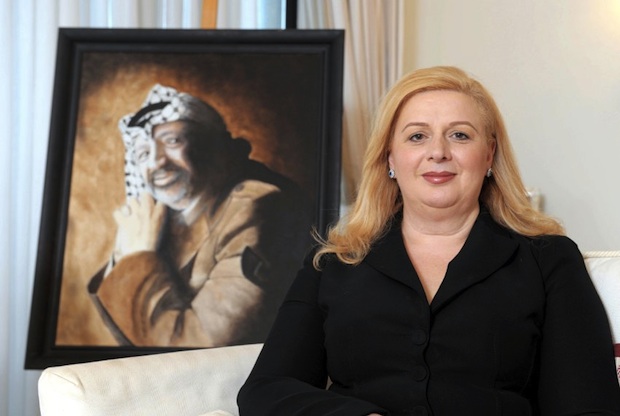UPDATES
Suha Arafat admits her husband planned the Second Intifada
January 4, 2013 | Sharyn Mittelman

Since the Second Intifada, which commenced in September 2000 but unlike the first one, involved massive armed terrorism against Israeli civilians, there has been an ongoing debate as to its origins. Israeli security sources have long maintained it was premeditated by the late Palestinian leader Yasser Arafat following his rejection of a generous peace deal at the President Clinton organised Camp David summit, but many Palestinians claim it erupted ‘spontaneously’ in response to a controversial visit to the Temple Mount by then Israeli opposition leader (and later Prime Minister) Ariel Sharon.
This debate has finally come to an end, with Yasser Arafat’s wife Suha admitting on Dubai TV on December 16 that her husband planned the Second Intifada (see clip) and told her about it before he launched it. According to a translation by the Middle East Media Research Institute, Suha Arafat told Dubai TV:
“Immediately after the failure of the Camp David [negotiations], I met him in Paris upon his return…. Camp David had failed, and he said to me, ‘You should remain in Paris.’ I asked him why, and he said, ‘Because I am going to start an intifada. They want me to betray the Palestinian cause. They want me to give up on our principles, and I will not do so.
I do not want Zahwa’s [Arafat’s daughter’s] friends in the future to say that Yasser Arafat abandoned the Palestinian cause and principles. I might be martyred, but I shall bequeath our historical heritage to Zahwa and to the children of Palestine.”
The Second Intifada lasted from 2000-2005 and resulted in thousands of deaths of both Israelis and Palestinians. It is tragic that Arafat believed that accepting the generus Camp David offer which would have established a Palestinian state on the West Bank, Gaza and parts of east Jerusalem, would have meant that he “abandoned the Palestinian cause” and instead chose such violence, with all the suffering it entailed for both sides. Sadly, this same attitude among many Palestinian leaders – the belief that accepting the sort of final two-state peace most international actors want to see and Israel has repeatedly offered amounts to a betrayal of “Palestinian principles” – remains probably the greatest barrier to a realistic peace today.
Sharyn Mittelman
Tags: Israel





